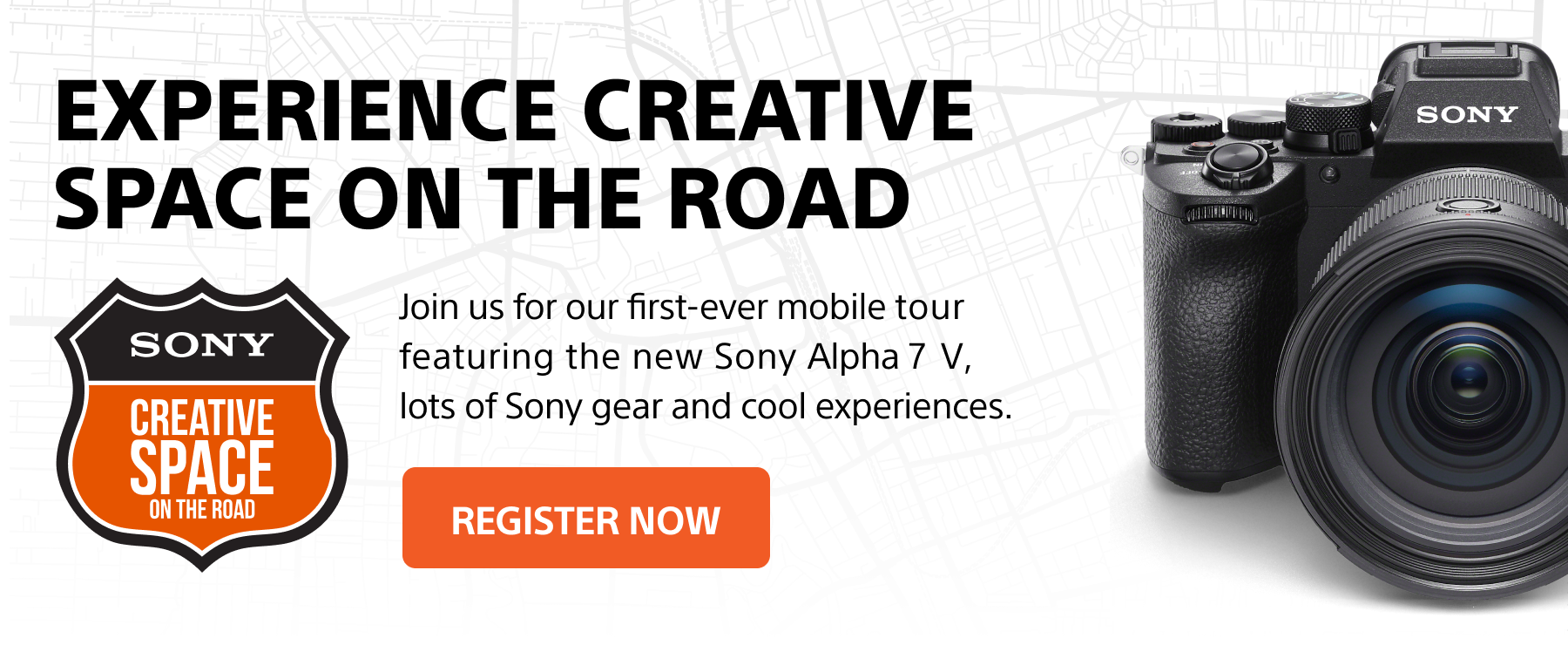Robert Evans is a Sony Artisan and storyteller wedding photographer. When photographing a wedding, he typically spends 10 hours a day capturing images to tell the story of the couple. His experience has enabled him to know exactly which gear he wants with him for each chapter of a wedding day – getting ready, family portraits, couples session, ceremony and reception. In Part 1, Evans, who shoots with Sony Alpha full frame bodies and a combination of Sony zoom and prime lenses, we learned his approach to the time when the wedding parties are getting ready. Now, in Part 2 we get a look at what’s in his bag for family and bridal party portraits and how he handles this aspect of the big day.
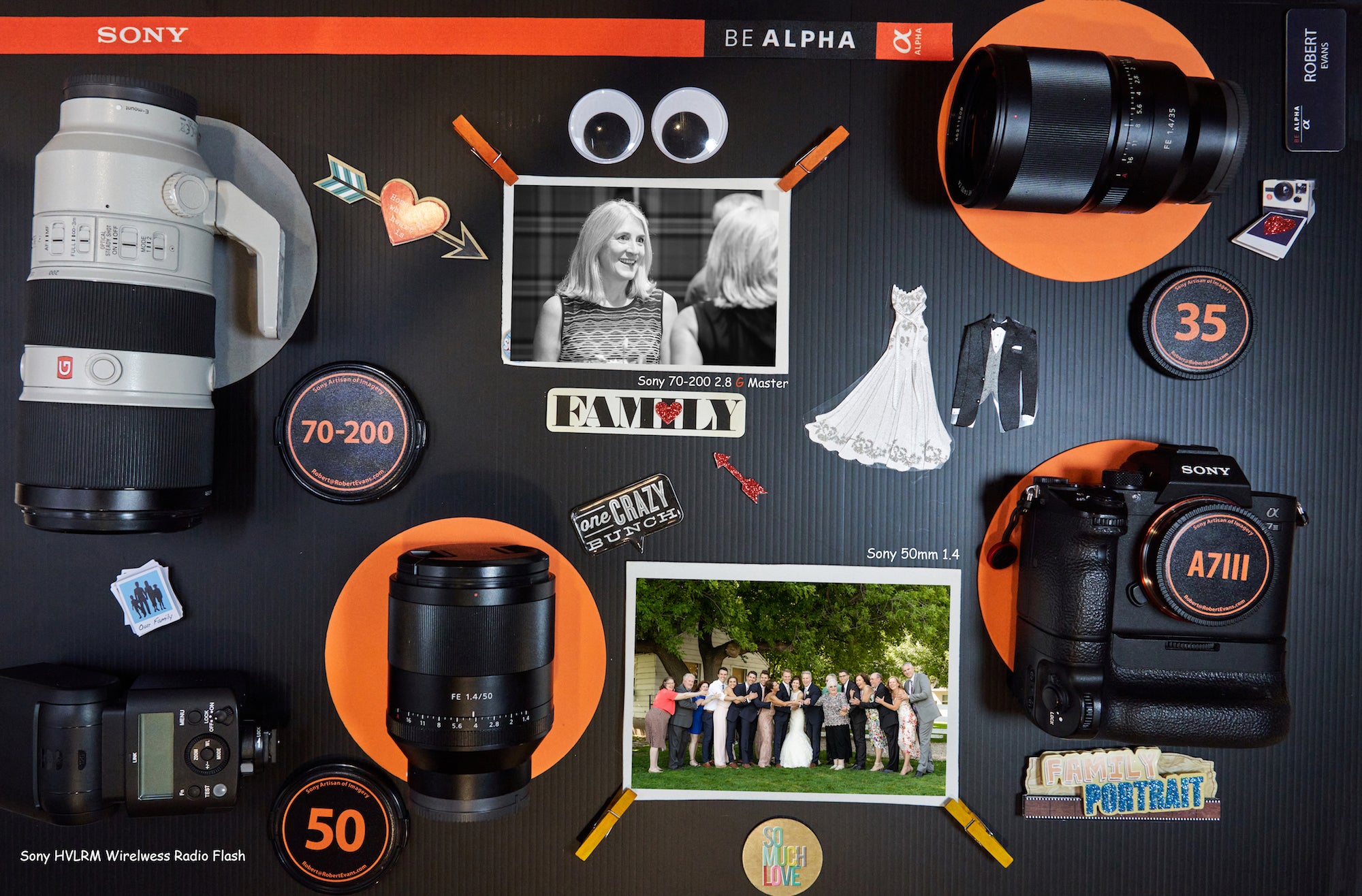
Family & Bridal Party Portraits
Cameras
I am currently shooting with the Sony α7 III and the Sony α9 II camera bodies throughout the day. I switch back and forth between these two bodies and use them for specific reasons on the wedding day, which I will share as we go along.
Lenses
Now let’s talk family and bridal party portraits. My first choice is the Sony 50mm f/1.4.
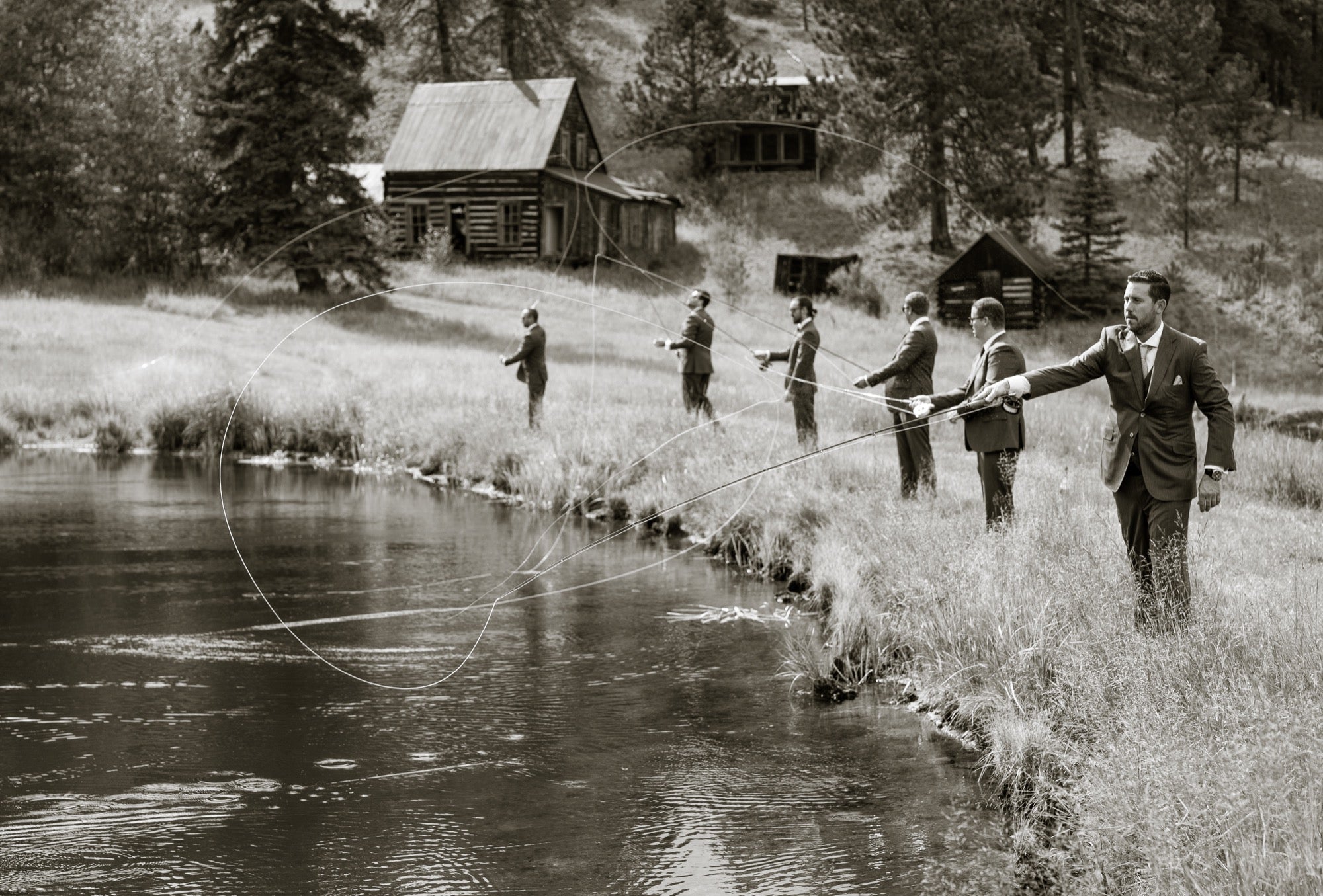
Photo by Robert Evans. Sony α7 III. Sony 50mm f/1.4. 1/1250-sec., f/3.2, ISO 200
I told you I like my Sony 50mm f/1.4 lens. I especially like the 50mm for my smaller portrait groups, any combination of two, three and four people. I prefer the fixed lens and not a zoom when photographing the small family groups. I shoot usually with a f/1.4 to f/2.8 aperture and use my feet to zoom in and out. I like a shallow depth of field to blur out my chosen background. I don’t worry about my subjects being out of focus as they are always side by side in these smaller groups. I am one hundred percent confident in the Sony autofocus in my α7 III, especially with the added benefit of Eye Auto Focus.
One great tip here, ask your subjects to give each other a hug. The hug brings out naturally genuine smiles and gets people to relax. I put my camera on a medium shutter burst and click off 6-7 images to ensure I catch the best smiles.
The Sony 35mm f/1.4 is for my larger groups. Again, I like to use a fixed lens for these larger groups and I move myself in and out to zoom. I make sure that now I am using a f/5.6 to f/8.0 aperture to make sure everyone is in focus front to back, especially, when I have several rows of people as I often use stairs to stagger and separate the faces, so as not have everyone in a long line. Hugs work great with large groups too. Make a few exposures as you normally would, then take a few more, asking the group to hug.
The Sony 35mm f/1.8 is an affordable equivalent. If you prefer an even wider lens, consider the new Sony 20mm f/1.8 which might be a better fit for you.
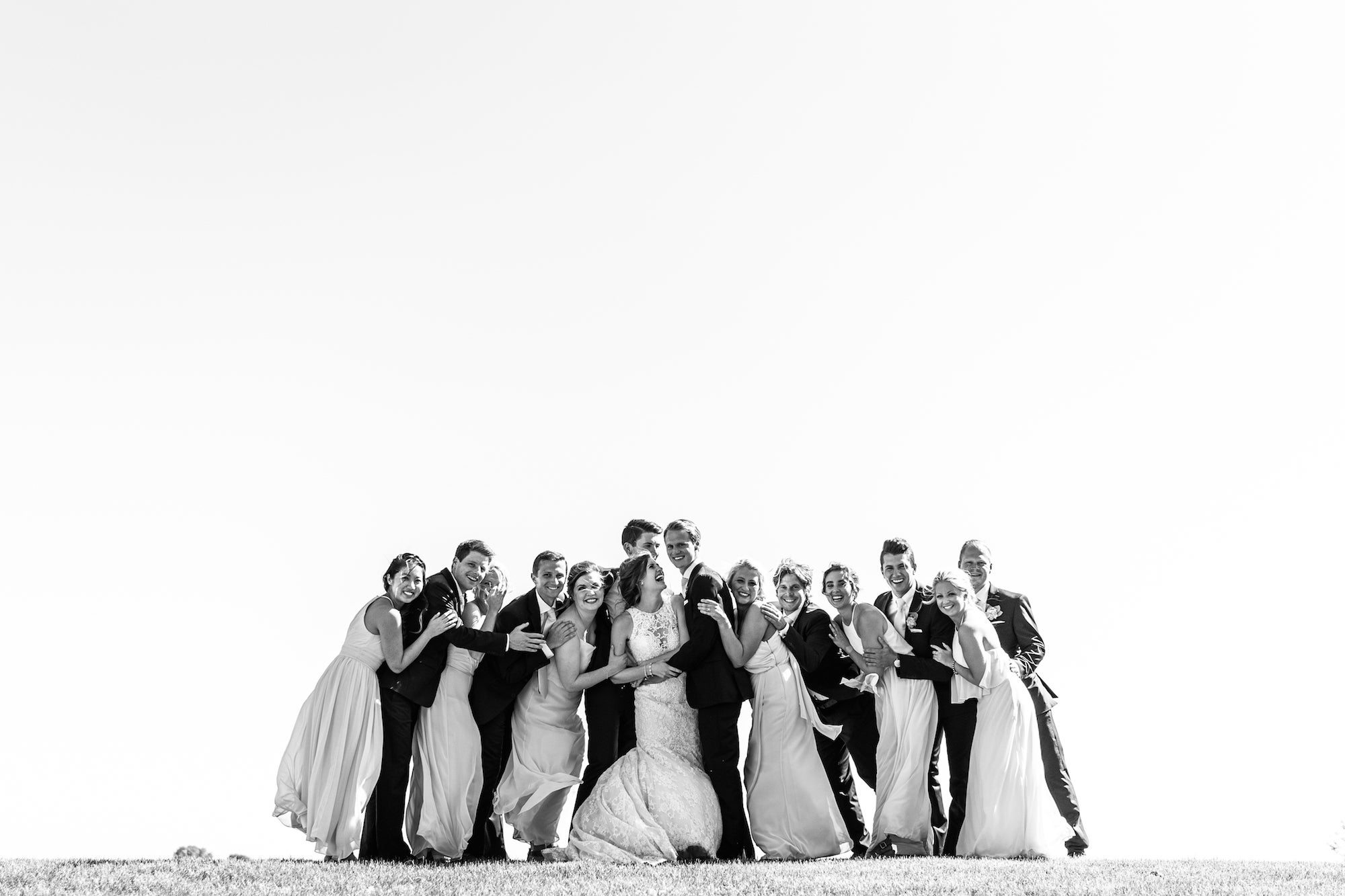
Photo by Robert Evans. Sony α7 III. Sony 35mm f/1.4. 1/8000-sec., f/1.6, ISO 200
I am sure you have gathered by now, I prefer non-zoom lenses for my portraits. So why am I including the Sony 70-200mm f/2.8 G Master in my top three go-to lenses for family and bridal party portraits? Because it's a great lens to capture candids during family portraits. You or your second photographer should be capturing all the moments happening around you while the family portrait session is taking place.
A lot of the time I direct and pose the groups, while my second photographer is the one to take the overall pictures. During this time, I am watching everyone around me and taking candid images with my 70-200mm f/2.8 GM of everything happening around the perimeter of the family group pictures. It’s hard to do both, so whether it’s you or the second photographer, don’t miss this opportunity to capture these great moments – especially the little kids and the grandparents.
I often use the Sony HVL-F45RM Wireless Radio Flash, especially on overcast days. I like to pop a little light on my subjects to fill in any shadows under eyes, caused by subjects with deeper eye sockets. Sometimes even on sunny days, especially when 95 percent of the time I am shooting family pictures in the shade to help make colors pop. It helps make the whites whiter, the blacks, blacker and the other colors richer and more vibrant, particularly on clothing. I set the flash on TTL but turn the settings down to -2 or -3 three stops to add just a wink of flash. I personally do not like my outdoor images to look like I have used any flash, even when I do.
Accessories
Finally, I wanted to give you a glimpse at the other accessories I bring along with me to a wedding. Because I find myself traveling to most of my weddings, I try to keep my gear as minimal and light as possible.
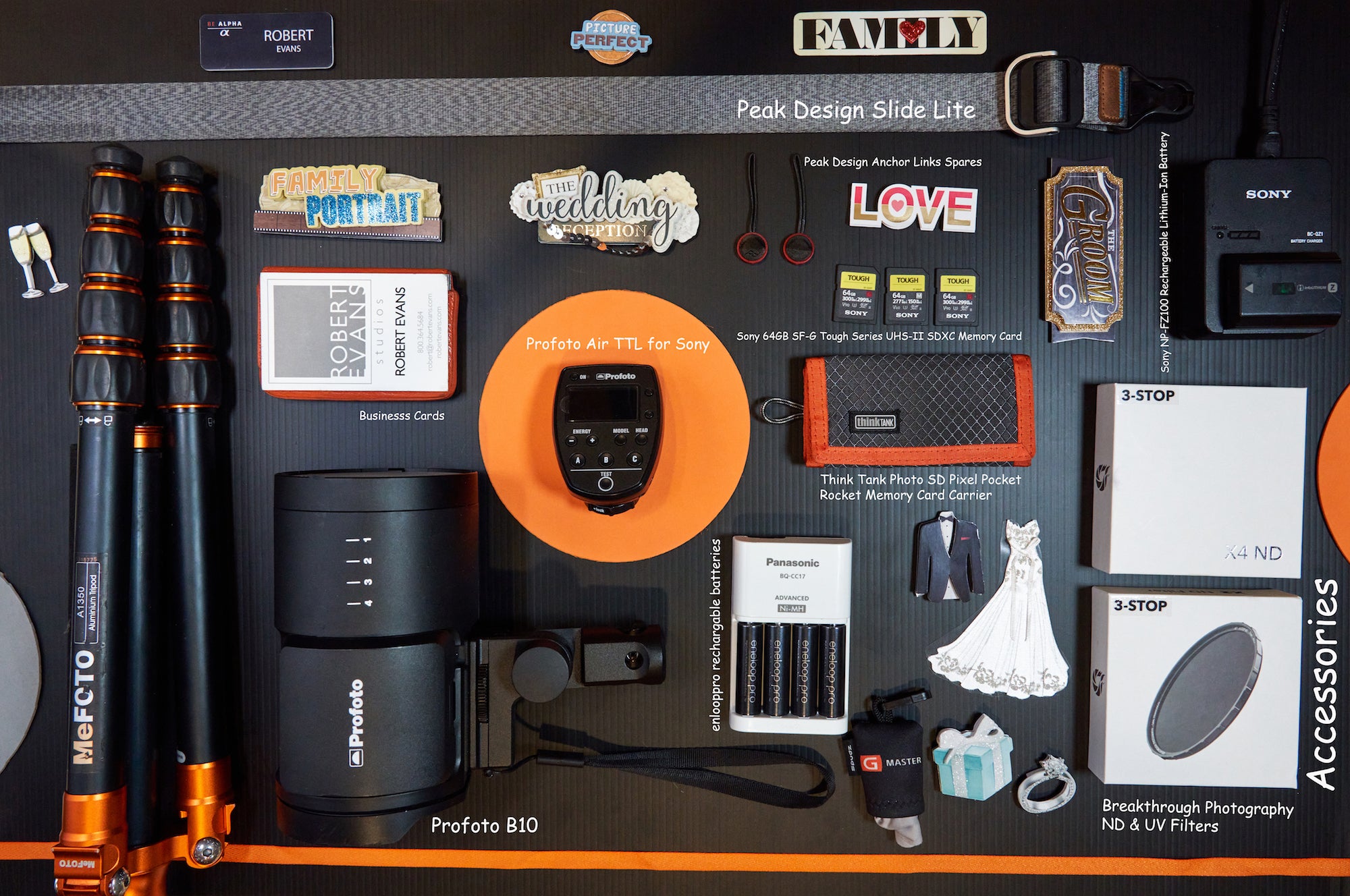
Of course I want to make sure I have the essentials, such as battery chargers for my Sony NP-FZ100 Rechargeable Batteries that fit in all my Sony Alpha bodies. I also bring plenty of SD Memory cards. I prefer the Sony TOUGH cards, SF-G TOUGH Series UHS-II SDXC Memory Card. I like the 64G capacity, and the fast write speed so I can capture 20FPS RAW when I need it along with the extra assurance that if I happen to drop a card, it will be OK.
Once I fill up a set of cards, I run one card in each slot recording RAW on both. I remove them from both slots and place them in my Think Tank memory card carry case. I keep it in the inside of my suit pocket. (Keep your cards on you at all times and at the end of the night empty your cameras and keep all the cards on your person. Should someone try to take your equipment, your clients' wedding images are safe in your pocket.)
AA Eneloop Pro Rechargeable Batteries For My Sony Flashes (I have two, one as back up): For a main flash I use and love the Profoto B10. There are two main reasons I love this flash: one, it’s small, light, and portable, and two, I can adjust the output for a tiny bit if flash at 1.0 or overpower the sun at 10.00 and anywhere in-between. As I mentioned earlier, I do not like my images to look like I have used flash in most cases, so 90 percent of the time I am using it to add just a touch of flash when shooting outside. Especially when I backlight my couples, I can add the perfect amount of flash to their faces to make it look like natural daylight – otherwise the skin tones come out looking muddy.
ND Filters: I keep several sizes of Breakthrough Photography ND filters with me as well. If I want to shoot my fast G Master lenses outside on a bright day wide open, I still can with a 3-stop ND Filter. You cannot shoot at f/1.4 or f/1.8 wide open even at ISO 50 on a bright sunny day. I like Breakthrough Photography filters because they do not change the color or cast on my images, especially when dealing with a white dress. It is also a great idea to keep UV filters on the front of your Sony lenses. We invest good money in our Sony glass, a UV filter helps protect the front element from scratches that can easily happen when working fast on the wedding day.
Tripod: I keep a MeFoto Tripod with me for the occasional motion blur exposure, or I sometimes use it for detail and décor images inside my reception rooms. It’s small, very light and easy to travel with.
Camera Straps: All my cameras are set up with Peak Design anchor links so I can quickly attach or remove any of my Peak Design camera straps. I absolutely love Peak Design camera straps – in my opinion the most innovative camera strap design on the market.
Business Cards: Finally, it’s always good business to keep business cards with you at all times. I have business cards in all my camera bags so no matter which bag I use, they are always on hand.
I think it is important to use the camera and lenses together with your favorite accessories that work best for you and make your job easy. These are my go-to choices but depending on the day I may use different lenses too. I have shared tips on how I use my Sony gear, hopefully my insight will help you improve your wedding photography and has given you some inspiration looking toward your next wedding. Check back to AlphaUniverse.com for Part 3 on the gear I use for wedding day newlywed portraits.


